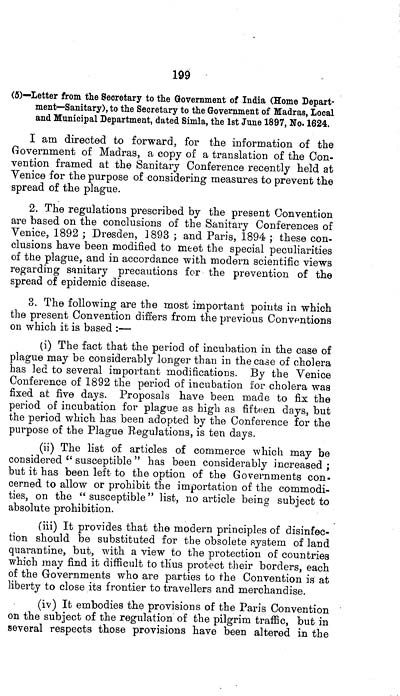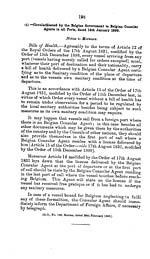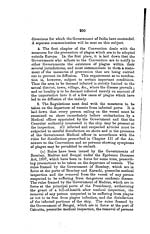Medicine - Disease > Madras plague regulations and rules > Volume 2
(201) Page 199
Download files
Individual page:
Thumbnail gallery: Grid view | List view

199
(5)-Letter from the Secretary to the Government of India (Home Depart-
ment-Sanitary), to the Secretary to the Government of Madras, Local
and Municipal Department, dated Simla, the 1st June 1897, No. 1624.
I am directed to forward, for the information of the
Government of Madras, a copy of a translation of the Con-
vention framed at the Sanitary Conference recently held at
Venice for the purpose of considering measures to prevent the
spread of the plague.
2. The regulations prescribed by the present Convention
are based on the conclusions of the Sanitary Conferences of
Venice, 1892; Dresden, 1893 ; and Paris, 1894; these con-
clusions have been modified to meet the special peculiarities
of the plague, and in accordance with modern scientific views
regarding sanitary precautions for the prevention of the
spread of epidemic disease.
3. The following are the most important points in which
the present Convention differs from the previous Conventions
on which it is based:-
(i) The fact that the period of incubation in the case of
plague may be considerably longer than in the case of cholera
has led to several important modifications. By the Venice
Conference of 1892 the period of incubation for cholera was
fixed at five days. Proposals have been made to fix the
period of incubation for plague as high as fifteen days, but
the period which has been adopted by the Conference for the
purpose of the Plague Regulations, is ten days.
(ii) The list of articles of commerce which may be
considered "susceptible" has been considerably increased;
but it has been left to the option of the Governments con-
cerned to allow or prohibit the importation of the commodi-
ties, on the "susceptible" list, no article being subject to
absolute prohibition.
(iii) It provides that the modern principles of disinfec-
tion should be substituted for the obsolete system of land
quarantine, but, with a view to the protection of countries
which may find it difficult to thus protect their borders, each
of the Governments who are parties to the Convention is at
liberty to close its frontier to travellers and merchandise.
(iv) It embodies the provisions of the Paris Convention
on the subject of the regulation of the pilgrim traffic, but in
several respects those provisions have been altered in the
(5)-Letter from the Secretary to the Government of India (Home Depart-
ment-Sanitary), to the Secretary to the Government of Madras, Local
and Municipal Department, dated Simla, the 1st June 1897, No. 1624.
I am directed to forward, for the information of the
Government of Madras, a copy of a translation of the Con-
vention framed at the Sanitary Conference recently held at
Venice for the purpose of considering measures to prevent the
spread of the plague.
2. The regulations prescribed by the present Convention
are based on the conclusions of the Sanitary Conferences of
Venice, 1892; Dresden, 1893 ; and Paris, 1894; these con-
clusions have been modified to meet the special peculiarities
of the plague, and in accordance with modern scientific views
regarding sanitary precautions for the prevention of the
spread of epidemic disease.
3. The following are the most important points in which
the present Convention differs from the previous Conventions
on which it is based:-
(i) The fact that the period of incubation in the case of
plague may be considerably longer than in the case of cholera
has led to several important modifications. By the Venice
Conference of 1892 the period of incubation for cholera was
fixed at five days. Proposals have been made to fix the
period of incubation for plague as high as fifteen days, but
the period which has been adopted by the Conference for the
purpose of the Plague Regulations, is ten days.
(ii) The list of articles of commerce which may be
considered "susceptible" has been considerably increased;
but it has been left to the option of the Governments con-
cerned to allow or prohibit the importation of the commodi-
ties, on the "susceptible" list, no article being subject to
absolute prohibition.
(iii) It provides that the modern principles of disinfec-
tion should be substituted for the obsolete system of land
quarantine, but, with a view to the protection of countries
which may find it difficult to thus protect their borders, each
of the Governments who are parties to the Convention is at
liberty to close its frontier to travellers and merchandise.
(iv) It embodies the provisions of the Paris Convention
on the subject of the regulation of the pilgrim traffic, but in
several respects those provisions have been altered in the
Set display mode to: Large image | Zoom image | Transcription
Images and transcriptions on this page, including medium image downloads, may be used under the Creative Commons Attribution 4.0 International Licence unless otherwise stated. ![]()
| India Papers > Medicine - Disease > Madras plague regulations and rules > Volume 2 > (201) Page 199 |
|---|
| Permanent URL | https://digital.nls.uk/74591048 |
|---|---|




